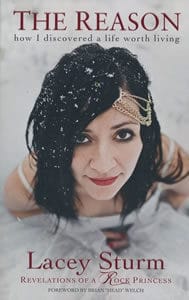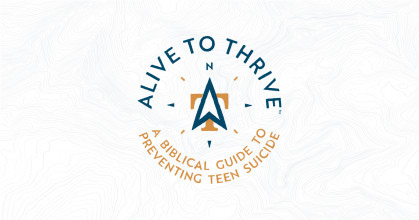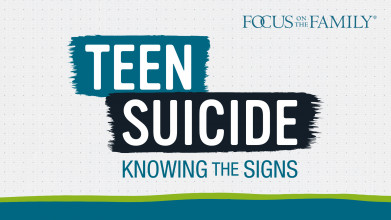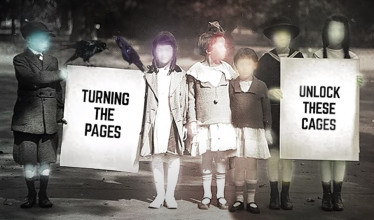
Homemade Meals for Busy Families
Mary Beth Lagerborg, co-creator of Once-A-Month-Cooking, discusses the importance of hospitality and how families can prioritize dinner time by cooking a month’s worth of healthy meals in one session.
Rescue 2x the babies from abortion!
Home » Episodes » Focus on the Family Broadcast » How God Saved Me From Suicide (Part 1 of 2)
Excerpt:
Mrs. Lacey Sturm: And I find because of my experience, I so despise the suicidal spirit, those suicidal temptations. I despise them. I feel like they’re so deceptive and they make themselves – it sounds so reasonable in the moment. It sounds like there is no other way. It sounds like it’s honorable. It sounds like it’s brave.
End of Excerpt
John Fuller: Hmm. That’s a dramatic statement from Lacey Sturm and she’s a self-proclaimed “hard rock princess” and she’ll confront those lies about suicide and share her incredible life story with us today. This is Focus on the Family. I’m John Fuller and your host is Focus on the Family president, Jim Daly.
Jim Daly: John, one of the great tragedies, I think, we’re experiencing at least in Western culture, certainly here in the United States, is the, um, separation that we have from one another. I think God intended us for relationship. He created us for relationship. And even with digital, you know, connection, we’re just not emotionally connected the way I think God intends for us to be. And we are going to talk to someone today who has come through some amazing difficulties. And she has a passion and a heart to reach a world for the Lord, but that puts her in some very unique situations. And I’m looking forward, one, for the example that she is to all of us to engage the world, not to pull back and build a bunker and hide from people who don’t think like us, but to be active in going out and getting messy in a world that’s messy on the Lord’s behalf. I think we’re all going to learn some things today.
John: Well this is really a challenging story and it’s full of darkness and despair, but there’s also a lot of hope here, and that’s what motivates Lacey to go out and find people who need Jesus’ love.
Jim: Without a doubt. And I want you to put that kind of perspective on the discussion we’re going to have today. Yeah, somebody who is in the rock and roll world, but is doing it for the Lord. And you may be scratching your head, thinking, how can those two even live in the same room? We’re going to learn how today. Lacey, welcome to Focus on the Family.
Lacey: Thank you.
Jim: Now you have a passion for people who don’t know the Lord, particularly those who struggle with difficult life circumstance and despair. And that’s because what you experienced growing up. Talk about your childhood, what was going on for you, and what was driving some of those despair moments?
Lacey: Well, my mom found herself in positions many times where she would need assistance or help, or she would just – we would be in need, and she – as she’s trying to struggle to be strong and take care of everything that needs to be taken care of, a lot of the authorities around us seemed to not be helpful, but to make things worse. And so, we kind of grew up with this feeling outcasted in a lot of sense, and I think the music was a really great way for us to – to find our own identity and creativity. And – and I noticed that in a lot of poverty situations. Like when I went to Rwanda with World Vision and I saw the kids there, they were dancing and singing…
Jim: Yeah.
Lacey: …And they were so creative. And I think a lot of that heaviness actually pushes out creativity when we use it as an outlet to deal with a lot of that weight.
Jim: You say in the book that you wrote, The Reason, that you grew up poor. I grew up that way as well. How did that impact you, though? What did you feel not having the stuff other people had, other children? When you went to school, what was that like?
Lacey: Well, you just feel like you’re not really a part of a lot of the things that go on, you know? Um, I kind of felt like, you know, getting bullied and made fun of for the clothes you wear or just being different, feeling a sense of rejection anyway. Um, you kind of just want to just be invisible when you’re at school so nobody picks on you.
Jim: You know, when you look at what’s happening in schools today, that bullying factor, there’s a lot of that going on. I mean even in our own community here we’re had a number of teen suicides which right at the school that my boys go to, and I’m having to have those discussions with my kids. And so often, what they’ve observed is that these young people are feeling that despair and they don’t know where to go with it. That was you. You were feeling that sense of despair, weren’t you?
Lacey: Yeah. You know I talk about in my book how I had a tragedy happen in my family. Um, my mom’s sister was a teen mom, and she had – she – it didn’t work out with her boyfriend and they ended up living with us when she was pregnant, and she had her son…
Jim: Your cousin?
Lacey: My cousin. And then he lived with us, and, um, when he was around three, she met a man, moved to Houston, and got married. And shortly after that, that man beat my cousin to death. So, he was abusive anyway. We knew he was abusive at times with my aunt, and we didn’t know he would do something like that. And of course when that happened, my mom had always talked to me about God, and whenever that happened – she always said God would take care of us, and I saw Him provide for us along the way.
But when that happened, I remember thinking, I thought God was going to take care of us. Why didn’t He take care of my cousin? Why is he dead and I’m alive?
Jim: And you were about 9 at the time? 9 or 10?
Lacey: I was 10.
Jim: 10-years-old.
Lacey: And I – I kept thinking, why is he dead, I’m alive? Why did it happen to him and not me? And how can I honor his death? Like, I wanted – and so, I understand this now, and I even realized it as I wrote the book, I didn’t realize it before that, that it was a conscious decision that I actually made. I didn’t realize that I made this choice, and God actually helped me as I was praying when I was writing the book, go back to that moment when I chose to stay sad for him.
Jim: Hm-hmm.
Lacey: So, I kind of did this as a loyalty to his death. I decided I was going to stay sad for him, and I actually became distrustful of people who were happy. How can you be happy in a world where children get beaten to death? Something’s wrong with you. You know, you’re either naïve or something’s wrong, you know?
Jim: Yeah.
Lacey: And I…
Jim: You also kind of turned your back on God, right?
Lacey: Yeah, I did not believe in God anymore. I felt like that was a broken chair people were telling me to sit in. It’s not – I didn’t feel like – and it made me angry when people would talk about God.
Jim: And this is all from the time you’re like 10 to 15, 16, right?
Lacey: Yes.
Jim: I mean that’s early to contemplate such weighty and heavy concepts, but you were seeing injustice in the world and feeling…?
Lacey: Yeah. You know, and the thing is, you’re talking about that – like, I would never assume that that wasn’t a normal thing, a normal reaction for a 10-year-old…
Jim: Huh.
Lacey: …But people say that all the time. When I was there in the situation, it was so logical to just ask yourself, where is God?
Jim: Yeah.
Lacey: He’s supposed to protect us and care for us. You talk about God all the time being good, well why not Him taking care of us? And then the same thing, in a – I would say a social – like we were in, we were in a situation, six kids and we’re really poor. We share everything.
Jim: Right.
Lacey: Everybody’s in the same – like for me, and maybe it’s a mother – a mothering thing for me, but I can’t eat without thinking, did you eat? You know, I mean it’s just…
Jim: Right. Right.
Lacey: …Since I was little, I never was able to – so when my cousin died, I can’t think, well, he died. Why am I not? And I always thought about death. And I always wondered about how long we live and…
Jim: How – how did resolution for that come about, because you’re young. Again, thinking of these concepts of why your cousin died at the hands of his, your aunt’s boyfriend…
Lacey: Mm-hmm. Her husband.
Jim: …And husband, and you’re already thinking that through as a 10-year-old. You’re rejecting God because you don’t see justice in the world, and if God is real and alive, there should be some justice in this world. How did you come to kind of accept that bad things happen in this life?
Lacey: I think that’s what drew me to people who actually talked about it and people who actually dealt with it, whether good or bad. I wanted answers. I wanted to know truth about those things. I didn’t have good resources, you know, like, when people were suspicious of, you know, the jovial kind of life, and you know, I related to that. Like, yeah, why, you know?
Jim: So, you’d say, “What’s wrong with those people that are so happy? They are living a lie.”
Lacey: Yes.
Jim: In essence.
Lacey: Yes.
Jim: And you identified with sadness and…
Lacey: Yes.
Jim: …In fact you mentioned in your book, The Reason, Kurt Cobain’s death and that was one that caught my attention. But the fact that it showed despair, you know, what was going on in his life? Here is a guy that was arguably was at the top of his game in music and had a lot of notoriety, and it was empty, obviously. And that really resonated with you and where you were at. How old were you when Kurt Cobain committed suicide?
Lacey: I was 12.
Jim: And it made an impact on you, right?
Lacey: I went from our perspective, as fans, I believe, it was heroic. And now I understand how strange that sounds that it could be heroic from an outside-of-that-situation perspective, and I know that a lot of cult – like, even there are cultures who consider suicide heroic. And I find because of my experience I am – I so despise the suicidal spirit, those suicidal temptations. I despise them. I feel like they are so deceptive, and they make themselves – it sounds so reasonable in the moment. It sounds like there is no other way. It sounds like it’s honorable. It sounds like it’s brave. And I remember there was an Instagram thing we went around, and my friend Jordan wrote on her arm, “It’s brave to live” because…
Jim: It’s brave to live.
Lacey: And that’s the thing is that a lot of people don’t, um, recognize that in those moments if you make a choice to continue to live after you’ve decided that you don’t want to live, you can do whatever you want with your life. You can hand it over. You can go on any kind of adventure. You can risk everything. You know, to look at that moment of not wanting to live and take it as a place of saying, “Well, let’s do something different. Let’s go a different direction.” And say – you know, for me, the day I planned to commit suicide, having – I know we’re getting ahead – but having an encounter with God, I remember thinking when I let that guy pray for me, it was like, well, I’m just going to go die.
Jim: Well, let’s talk about it, because we’re right at that point, this despair, this path of despair…
Lacey: Right.
Jim: …That you were kind of meandering down because you despised happy people and joyful people. I’m sure there weren’t many committed Christians that were giving you the answers that you needed at that moment as a 12-, 13-year-old. But what was that allure to move into greater despair and even contemplate taking your own life and doing what you thought would be a brave act like Cobain…
Lacey: Right.
Jim: …And say, “Okay, I’m not enjoying this life. I’m going to end it”?
Lacey: Well with…
Jim: Talk about what got you to that point.
Lacey: Well with Nirvana, the message was – they came out in a materialistic time in the 80s where everybody has the in and they are so flamboyant, and, you know – and all this kind of like expensive, whatever, and they came out looking like homeless people.
Jim: Right. Torn shirts, the whole bit.
Lacey: Right. And they actually identified with a homeless community. Like he was celebrated for having been homeless and living under a bridge. He had a song called “Under the Bridge.” And so, to be celebrated as a poor person who wears those kind of clothes because that’s from the thrift store and who gets made fun of because you have nothing, all of a sudden now you have an identity and you’re like, “Yeah, we have a voice here.” And when he got into being famous, you could see in his interviews the struggle he had with being famous and being noteri – like everybody knowing him, but him wanting to be an – an everybody person. And they kept exalting him and you could see the struggle in a sense in his interviews. And so, when we as fans, what we perceived – well, what I perceived – was that he was saying, “I don’t want this. I’m better than you.”
Jim: Right.
Lacey: “I’m above you. Um, but I don’t know, like, how to let go of it. It’s like I’m stuck and sort of trapped in this.”
Jim: But that was attractive to you. You were identifying with that because that was you. You were living in clothes you got from the thrift store. You were poor. Your dad wasn’t in the picture. And so, you were identifying. How did you end up going to that church on that day where your life changed?
Lacey: Well, my grandmother had…
Jim: Your grandmother?
Lacey: Yes, I was kicked out of my home for getting in fights with my mom a lot, and police were called several times, and I went lived with my grandmother in Mississippi.
Jim: That was the last resort for your mom? Let’s put you with grandma and just see if she can straighten you out?
Lacey: Well, the police suggested that we find another place for me. And, um, I’m glad…
Jim: Huh. It was that intense?
Lacey: Well, yeah. They were picking me up for running away. Things like that. And, um – and so, they were like, just asking. And I’m so thankful. You know I always sort of viewed the police as the enemy because when we would get pulled over, my mom wouldn’t have the money to do an inspection sticker and then she’d have to pay that ticket, and then we wouldn’t have money for rent, and we would get evicted from our house, and it was just this cycle of “watch out, the police are coming.” Don’t – there’s all six of us shoved in a car on top of each other’s laps, which we had this tiny little car, which is illegal. And so, she’s like, “Lay down. The police are here.” And then of course they come, and she gets in trouble and it’s just never-ending.
Jim: Right. So, you always thought of them as the bad people.
Lacey: But whenever they show up – showed up at the house, and, um, now that I look back, they were like, “Maybe you should look at another place to stay,” and I thought, wow, you know we really needed that. Like it was too much.
Jim: Huh. So, you went to grandma’s. Now how was that? When you showed up at grandma’s house, was she all loving and…
Lacey: It was relieving.
Jim: It was?
Lacey: It was so relieving to get out of the environment being stressful. And just starting over is such a great feeling. (Laughter)
Jim: But you did have some conflict, right?
Lacey: Right. Well, I’m still struggling with all the things I struggle with, but there is a relief in starting over, you know.
Jim: Yeah.
Lacey: And so, then, you know, I still am drawn to those people. I’m hanging out and I’m trying to find ways – you know, we end up doing drugs, like being involved in drugs, and just this – not doing, following the rules at home the way I am supposed to. And I don’t think it was necessarily vindictive. It was just I had a hard time understanding sometimes, just transitioning is hard anyway.
Jim: And your identity was growing within that community, right?
Lacey: Yeah. Well, I magnified any little thing in my mind that was rejection.
Jim: Right.
Lacey: Anything that was a discipline, I magnified it in my mind and said – just always thinking, they don’t love me. And – and, um, I’m a burden to them. That was the biggest…
Jim: That was what you felt at that age? They don’t love me and I’m a burden.
Lacey: Mm-hmm. They just…
Jim: Yeah. That can be devastating to a child.
Lacey: Yeah. And you look at them and you think…
Jim: You just don’t feel good enough.
Lacey: Well, I feel like they wanted to do the right thing because they have to do the right thing. I didn’t feel like I was a blessing to them. I felt like a burden.
Jim: Do you – do you ever think about your behavior being a test of their love to say, “Will you love me even if I act this way?” Have you ever thought of that?
Lacey: (Laughs) Maybe subconsciously there was that.
Jim: Yeah. “Will you still love me?” In fact, you and your grandma had a bit of a shouting match, if I read that correctly in your book.
Lacey: Yes.
Jim: There was one day where the two of you verbally just went after each other and you were yelling, and she started to yell back at you, and she didn’t stop for an hour?
Lacey: Mm-hmm. Yeah.
Jim: What did – literally just screaming?
Lacey: Yeah. Well, her husband, my grandfather, was in the hospital, had, had a heart attack earlier that week, and she was trying to tell me, “You’re not obeying our rules. You’re getting in trouble at school. You’re doing things that are illegal. All of this is stressful. Your father – your grandfather is in the hospital. He had a heart attack earlier this week. And you’re not helping anything.” What she’s trying to say is, “Your actions affect more than just you. There’s more people impacted by your problems than just you.” And that’s actually good advice for somebody who’s depressed, to get them to take their mind off themselves and focus on how they can help other people around them. But I was looking for a reason to end my life, and so, I twisted her words from what she meant, “We love you. You’re impacting us because we love you,” to saying, “Our life would be better without you.” Which is not what she…
Jim: Which is what you were feeling she was saying?
Lacey: This is what I had twisted – the enemy twisted that in my mind.
Jim: Yeah.
Lacey: Which was not true at all, because there is no way it would have been less stressful if I had committed suicide on my family. It would have been more stressful. And but I found it to say, “Life would be better without you. I’m going to take my life. I found a selfless reason.”
Jim: In that context, talk about, though, she was going to outlast you in terms of screaming, right?
Lacey: (Laughter).
Jim: I mean that’s what caught my attention. You’re kind of holding back here a little bit. She was – she was determined to out-scream you. You’re screaming at her, and she just decided, “Okay, today’s the day. I’m going to take you on toe-to-toe.”
Lacey: You’re going to church.
Jim: And she then said you’re going to go to church!
Lacey: (Laughter) Which was my punishment for skipping school that day.
Jim: So, what happened? She took you to church. She didn’t even go in, did she?
Lacey: No, she couldn’t because if she did, she would end up talking to people and I could have gone out and ran away.
Jim: Was this a church that she went to?
Lacey: Yeah.
Jim: Okay, so, she was regular, but she sat in the parking lot…
Lacey: She sat by the doors…
Jim: …And forced you to go in.
Lacey: …In front of the doors.
Jim: (Laughter) There’s a tactic, John.
Lacey: Like, if you walk out that door, she’s right there in the van.
Jim: So, you go in. What are your feeling when you walk in this church? Feeling despair, feeling rejected, not feeling loved, and your grandmother is forcing you to go to church. What are you thinking when you walk in the door?
Lacey: I hate everybody. (Laughter)
Jim: You hate everybody.
Lacey: I hated everybody. I hated everybody, especially the pastor, and he was – and I also had this – you know, felt like I was an intellectual and was in Mississippi, and everybody, to me, is like, you know, they’re not educated – which is not true. They just talk, you know, real like…
(LAUGHTER)
Lacey: I really respect them now.
Jim: You feel like you know more than anybody else around you, but…
Lacey: Yes, exactly.
Jim: …But what happened in that church service that got your attention?
Lacey: Well, when he spoke, he began to talk about scenarios that he had be through that were just like I was the only person in the room and, like, he was telling my story.
Jim: What did he say?
Lacey: Well, he talked about different families and the struggles they went through. He talked about the kids feeling isolated and having to take on more responsibility than they need. And he talked about how the violence that happens in those situations and how they become – you know, they feel alone and misunderstood.
Jim: He talked about suicide. Someone…
Lacey: He stopped in the middle of all of that and just started crying. And that was really impactful to me because I never saw – to see someone be sad, I mean, to weep over someone they don’t know and to weep over someone who despairing of life. Even just seeing him weep resonated with me. Like, do you cry? Like, do you have pain in your life? Like, I will listen to you if I know that you can understand that that’s how I feel, you know?
Jim: Wow.
Lacey: And so, for him to weep stopped me and made me listen.
Jim: And he doesn’t know you’re there, really, and what your issues are.
Lacey: No, he doesn’t know me at all.
Jim: He’s just speaking to the full audience…
Lacey: Yeah.
Jim: …And he’s saying, “I feel a heavy heart for somebody.”
Lacey: He – he didn’t say anything. He just – weeping. He stopped talking and just weeping. And everybody is listening, and you can feel some people are embarrassed and it’s uncomfortable and he says – finally, he’s wiping his tears – he says, “There’s a suicidal spirit in this room.” And it was just total silence. And everybody realized, you know, you’re crying because you feel like a sense that there is somebody here that wants to take their life. And I was like (gasp), you know, like…
Jim: And that was you.
Lacey: Yes. That was me. And he’s just wiping his tears, and he says, “Please come up here and let us pray for you, whoever you are. God has a plan for your life. He doesn’t want you to die tonight.” And he’s like wiping his tears, and the man – you know, I didn’t go up there. I wouldn’t. My pride wouldn’t let me go. And can you imagine being him? I think about this now. He’s passed away now. But how brave it is to say that and have no one respond.
Jim: Right, you think you’ve failed.
Lacey: You think you just maybe made something up in your head. Maybe – who knows? Whatever. He didn’t care. He was…
Jim: But somebody caught you on the way out, right?
Lacey: Yeah, I went to leave…
Jim: What happened?
Lacey: There was a man. I still talk to him. We call him “Papi.”
Jim: Papi.
Lacey: Mm-hmm.
Jim: So, he caught you at the end of the service, and what did he say to you?
Lacey: I didn’t know him. And he said, “I feel like the Lord wants me to speak to you.” And he had tears in his eyes, too. I think he knew. (Laughs) I don’t know. (Sniffles) God knew. It doesn’t matter if he knew, I guess. But he said, “I feel like the Lord wants me to speak to you and He wants you to know that even though you’ve never known an earthly father, that God will be a better Father to you than any earthly father could ever be.” And when he said that, I thought, I don’t need a dad. I don’t need a man in my life. I hated men. I mistrusted men, especially older men that were strangers. And he’s looking at me. The first thing is he looked at me with such love, like, I never saw pure, no, just love…
Jim: Unconditional love.
Lacey: …In a strange man’s eyes, directed at me like he knew me. And I was, like, thinking, I don’t need a dad. And then he spoke, and he’s like, “God has seen you when you cry yourself to sleep at night.” And he – he said, “You’ve been rehearsing your pain. There has been pain in your heart from your own sins and the sins of other people committed against you and your family, but I want you to know that Jesus died on a cross to take the sins of the world on Himself, so He took the effect of the sin, He took our pain, so we don’t have to carry it in us.” And he said, “Can I please pray for you and ask Jesus to take the pain out of your heart?” And I was just, like, at that moment where I’m, like, I’m either going to die or I’m going to wait a minute and let this guy pray for me. And how can he know all these things? And I finally was like this flicker of receptiveness came.
Jim: A little spark.
Lacey: I was like, “Okay, you can pray.”
Jim: Isn’t that something? Praise God, huh?
Lacey: Yeah!
Jim: I mean that crack in the door. Your heart opened up.
Lacey: Well, I was such an outspoken atheist, and I was, like, unless I saw for myself, I was not going to believe. And so, I love that God is just – He knows what we need and He’s so kind. And it still took a choice for me to say, you know, “I’m going to let you pray for me.” And so, he put his hand on my shoulder and began to pray, and he said, “God, I pray that you wrap Your arms around this girl You created,” and when he did that, I felt like God showed up right in front of me.
Jim: And, Lacey, I think this is a good place to acknowledge that change, that beginning of the change. But I think people are going to benefit to hear more of your story and how God began to, probably the best way to sat it is just remove the gunk in your life. Would that be fair?
Lacey: Yeah.
Jim: And He began to change you. You didn’t change overnight. You still had issues to deal with. I think so often people who have that transformation think, “Tomorrow I’ll wake up and everything will be all right and I will no longer be captivated by those sins that have ensnared me.” That’s not typically what happens. In fact, what typically happens is it becomes more of a fight, that those things that ensnare you become even more difficult.
If we can, let’s come back next time and continue this discussion and talk about how God helped you along the journey, gave you a heart for the sinner – which I love, and we haven’t been able to talk about that yet. But I want to talk about why you continued then in rock music to reach people in the Lord in an environment most Christians would say, “Run!”
Lacey: (Laughter) Yeah.
Jim: “Don’t go there!” But you’re doing it, and I want to lift that up. Let’s come back and talk about that.
Lacey: Okay.
Jim: John, I’m certain there are people listening right now who are in the dark, hopeless place like Lacey was. Maybe you’re feeling like your life doesn’t matter. And that’s simply not true. God loves you and cares about you more than you realize. And as Christ’s followers, we feel the same. We love you, too. Let us be that person, like Papi, who says “Can we pray for you and ask Jesus to take the pain out of your heart?” Focus on the Family is here for you. We have caring, Christian counselors who will listen to your story and respond with tools and resources to point you in a better direction. We want to come alongside you to help you on your journey to healing.
John: Get in touch with us right away by calling 800, the letter A and the word FAMILY. 800-232-6459. Or you can click the “Find a Counselor” link at focusonthefamily.com/broadcast. And, Jim, we’ve seen so many transformed lives through the services of our great counselors and all the other help we have available to people. But it does take a lot of financial assistance for us to offer these kind of resources.
Jim: Well, it does, John. Let me say thank you to the friends who have given so generously to this ministry, enabling us to reach out and rescue hurting individuals and families, and share the good news of God’s love with them. And if you’re not already supporting us on a monthly basis, can I invite you to make a monthly pledge to Focus on the Family today? That monthly gift really helps our budgeting process and ministry planning as we look forward to strengthening more marriages and equipping parents, saving baby’s lives and so much more in the coming months. But we can’t do this without your help. So, please consider a monthly pledge today.
John: And if you can’t afford a monthly commitment at this time, we do understand. Even a one-time gift would be helpful. So, as you’re able, please, make a donation today to Focus on the Family and we’ll say thank you by sending a copy of Lacey Sturm’s book, The Reason: How I Discovered a Life Worth Living. Let me also mention some powerful resources that our parenting team has developed. We want to help your family better understand and address the risk of teen suicide. And you can find our “Alive to Thrive” video series on the website, along with a new podcast series called “Teen Suicide: Knowing the Signs.” Donate, get Lacey’s book and learn more about these online resources at focusonthefamily.com/broadcast. Or call 800, the letter A and the word FAMILY. Well, plan now to join us next time for more of Lacey Sturm’s powerful story. For now, I’m John Fuller and on behalf of Jim Daly and the entire team here, thanks for listening to Focus on the Family. And join us next time as we once more help your family thrive in Christ.

Lacey Sturm is a singer-songwriter and the lead vocalist for the alternative rock band Lacey. She is the former lead vocalist for the platinum-selling band Flyleaf and has performed as a solo artist for the Franklin Graham Evangelistic Association’s Rock River events. Lacey is a spokeswoman for youth movement organizations that are designed to positively impact today’s music, skateboarding and art culture. She has authored two books, The Mystery and The Reason. Lacey’s husband, Joshua, also performs in her band, and the couple has two young children. Learn more about Lacey by visiting her website, www.laceysturm.com.

Receive Lacey Sturm's book The Reason for your donation of any amount! Plus, receive member-exclusive benefits when you make a recurring gift today. Your monthly support helps families thrive.

There's no place like home, right? Just as home brings a sense of belonging, rest, and security, so does a personal relationship with Jesus Christ. If you don't have one, this booklet can show you how to find your place in God's eternal family.

Alive to Thrive teaches you about issues that can lead to suicide and how to address them long before your child might ever entertain thoughts of ending his or her life.

A new podcast series helping you distinguish normal teen behavior from serious problems like depression and suicidal thoughts. Tune in to hear expert advice and insightful stories from people who have overcome teen depression.

Visit our online store and purchase a CD of today's program for yourself or to share with a friend.

Mental health connects with every other component of our health, including our emotional, relational, physical, and spiritual health. As parents, we can help our children thrive in the area of mental health by keeping all these components in balance with one another.

Suicide is a problem in the youth and young adult population. There is hope for healing when parents and others are intentional about providing help.

I knew my daughter was struggling emotionally, but I had no idea about the extent of her depression.

Sometimes you can't see suicide coming. Sometimes you can -- and sometimes you can stop it.

Lacey Sturm encourages Christian listeners to fully commit themselves to living for God.

Visit YouTube to watch Lacey Sturm's offical music video for her song "The Decree."

Check out Lacey Sturm's music video for her song "The Soldier."

Please let us know what you think about our broadcast! To help us provide the best possible programming for you, we need your honest feedback on how we're doing and how we can get better.

Mary Beth Lagerborg, co-creator of Once-A-Month-Cooking, discusses the importance of hospitality and how families can prioritize dinner time by cooking a month’s worth of healthy meals in one session.

Scott Klusendorf, President of The Life Training Institute and Robyn Chambers, Vice President of Advocacy for Children at Focus on the Family, share strategies and encouragement in the pro-life movement. They offer compassion for abortion-minded women and speak up for pre-born babies. (Part 2 of 2)

Scott Klusendorf, President of The Life Training Institute and Robyn Chambers, Vice President of Advocacy for Children at Focus on the Family, share strategies and encouragement in the pro-life movement. They offer compassion for abortion-minded women and speak up for pre-born babies. (Part 1 of 2)

Larnelle Harris shares stories about how God redeemed the dysfunctional past of his parents, the many African-American teachers who sacrificed their time and energy to give young men like himself a better future, and how his faithfulness to godly principles gave him greater opportunities and career success than anything else.

Amy Carroll shares how her perfectionism led to her being discontent in her marriage for over a decade, how she learned to find value in who Christ is, not in what she does, and practical ways everyone can accept the messiness of marriage and of life.

Jonathan McKee offers parents practical advice and encouragement in a discussion based on his book If I Had a Parenting Do Over: 7 Vital Changes I’d Make.
